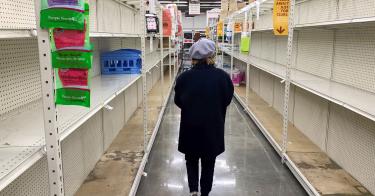This week has seen a flurry of legislative proposals to deal with the possible economic fallout from the coronavirus pandemic.
Some would pour money into the coffers of big businesses and special interests, claiming they need a bailout. Others would broadly expand government programs.
A different approach is needed.
In general, any policy response should be targeted and temporary—and tied to addressing the underlying crisis of the viral attack and the actual problems American families may face as a result.
While events are still unfolding and the downstream challenges are still ahead, The Heritage Foundation has laid out one part of such a solution that would foster the ability of private firms to provide flexible paid leave in declared epidemic areas.
Enabling more workers threatened by the virus to take leave would aid public health efforts by reducing the risk of the spread of infection.
Any potential solution also needs to examine how to help our nation’s poorest receiving social services. The wrong way to do this? Expand government programs, carte blanche.
Today, the federal government spends more than $1.1 trillion annually on welfare benefits through a system that can provide the platform for a narrow, temporary, and targeted response if one becomes necessary.
Senate Minority Leader Chuck Schumer, D-N.Y., and House Speaker Nancy Pelosi, D-Calif., called on Congress to “expand [food security programs such as] SNAP, WIC, school lunch, and other initiatives and suspend implementation of any regulations that weaken federal food assistance, in order to ensure vulnerable populations do not lose access to food during this epidemic.”
It’s not clear which “regulations” Schumer and Pelosi are referring to. If we assume they mean pending regulations by the Trump administration, these regulations are intended to strengthen program integrity and remove wasteful benefits to higher-income people, such as millionaires getting benefits in states exploiting loopholes in federal law.
Such regulations are irrelevant to the coronavirus situation.
And it doesn’t make sense to just expand food security programs. Instead, if the crisis spreads and grows, policymakers should use targeted and temporary policy levers to ensure low-income, hungry people eat. Specifically:
- If a school shuts down due to the coronavirus, low-income children will no longer receive government-subsidized breakfast and lunch. Some 22 million children from low-income families receive meals from the national school lunch and breakfast programs. Nearly all of these children are also eligible for food stamps. If a child can’t go to school because it’s been shut because of the coronavirus, Congress can make more food available to them by increasing the amounts on their parents’ food stamp electronic benefit transfer card.
- It goes without saying that work requirements for programs such as Temporary Assistance for Needy Families and food stamps should be waived if they are incentivizing people to expose themselves to deadly pathogens. In those circumstances, states have the authority to manage the situation. Congress does not need to act.
- If low-income people live in an area designated by the federal Centers for Disease Control and Prevention as an epidemic area, they might have difficulty obtaining food, especially if prices rise. Under that circumstance, Congress can give the Department of Agriculture authority to increase the food stamp allotment on recipients’ electronic benefit transfer cards for people who live in those areas.
- Finally, Congress could increase emergency food supplies through the Temporary Emergency Food Assistance Program in order to provide emergency food supplies in troubled areas designated by the CDC. That’s the program that gives government-funded food to food banks.
We don’t know yet how far the virus will spread or how long this situation will last. Currently, the CDC suggests the virus is not widespread.
We do not know how severe or broad its impact will be, but politicians should not use the current uncertainty as an excuse to achieve policy goals unrelated to the crisis, to bail out special interests, or to broadly expand government programs.
If circumstances develop that warrant intervention, Congress’ policy response should emphasize a targeted response that protects and empowers the affected individuals and families, rather than reflexive big government responses.
This piece originally appeared in The Daily Signal




